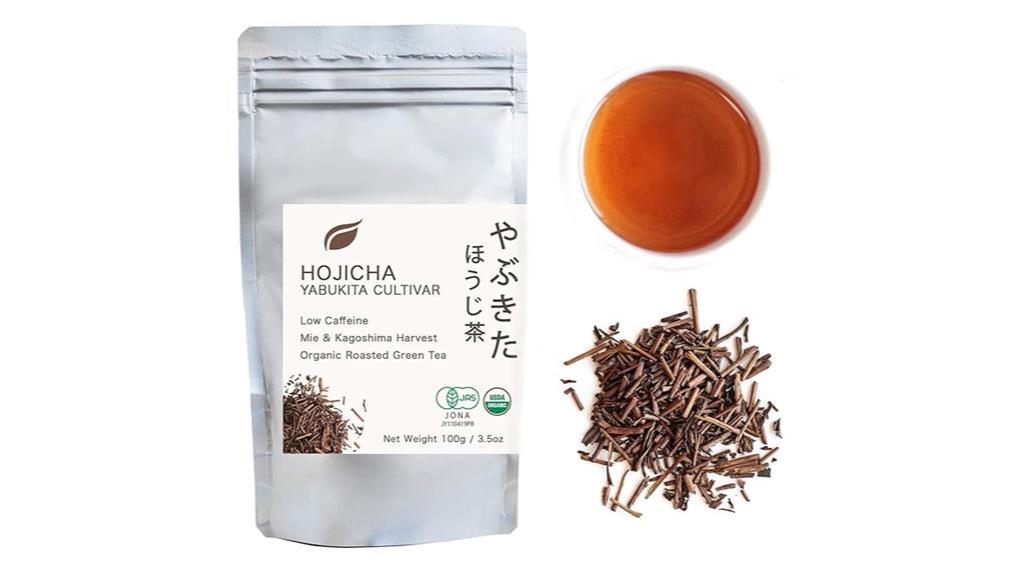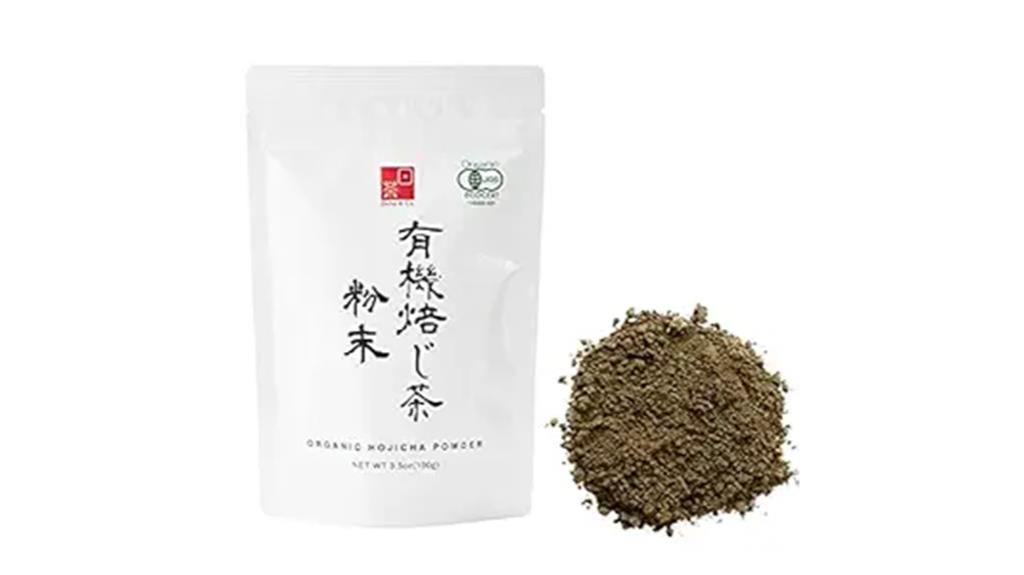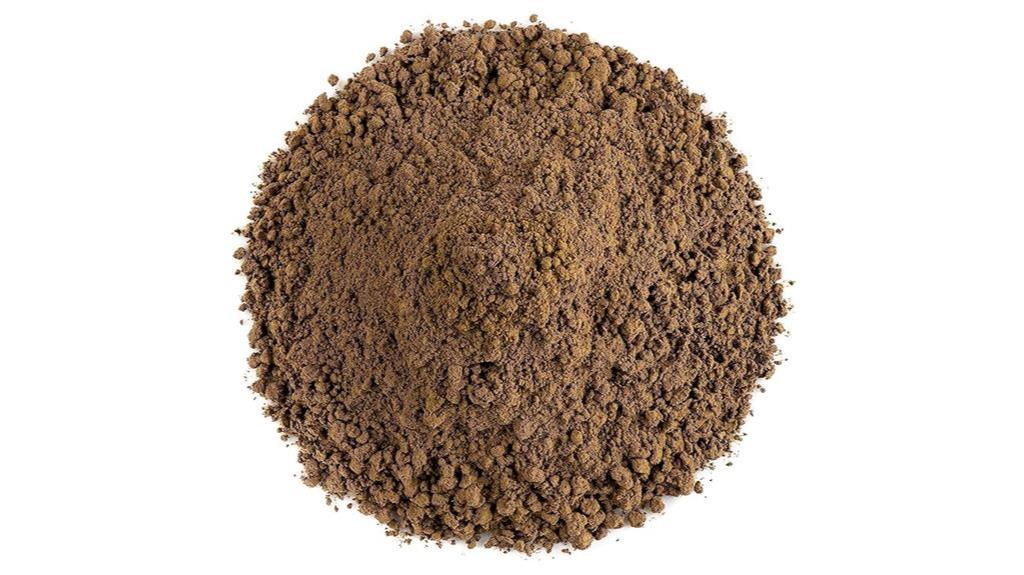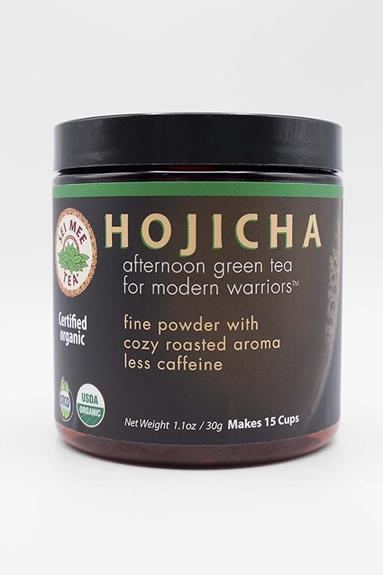Oh, the joy of discovering new teas! Today, we’re excited to share our review of the Organic Japanese Hojicha – Yabukita Cultivar. As
Key Takeaways
- Organic Japanese Hojicha – Yabukita Cultivar offers a stem-heavy houjicha with a naturally sweet and mellow flavor.
- The
tea has a low caffeine content and is produced using a radiation-free process, making it a standout choice fortea enthusiasts seeking a safe and soothing experience. - The careful selection of organic Yabukita
tea leaves and meticulous roasting process ensure a pure and natural taste. - The
tea is available in different sizes, providing flexibility and convenience to cater to customer needs, and has a unique flavor profile with a balanced astringency and sweet hints of malty, roast notes.
Product Overview
Let’s now take a look at the unique selling points, ingredients, and size optimization of the Organic Japanese Hojicha – Yabukita Cultivar. These aspects give us valuable insights into what sets this
Unique Selling Points
The unique selling points of this organic Japanese Hojicha – Yabukita Cultivar include its stem-heavy houjicha with a naturally sweet and mellow flavor, its low caffeine content, and its radiation-free production process.
- Stem-heavy houjicha with a naturally sweet and mellow flavor
- Low caffeine content
- Radiation-free production process
Our Yabukita Cultivar hojicha stands out for its stem-heavy composition, resulting in a unique flavor profile that is naturally sweet and mellow. With its low caffeine content, it offers a soothing and calming experience, making it a perfect choice for those looking to relax. Furthermore, our hojicha is produced using a radiation-free process, ensuring the highest level of safety and quality. These unique features make our organic Japanese Hojicha – Yabukita Cultivar a standout choice for
Ingredients
Continuing our exploration of the unique selling points of our organic Japanese Hojicha – Yabukita Cultivar, let’s now delve into the factors that make this product truly exceptional.
- Organic Yabukita
tea leaves: Our hojicha is made from carefully selected Yabukitatea leaves, known for their rich flavor and aroma. These leaves are grown organically, ensuring a pure and natural taste. - Roasting process: The
tea leaves undergo a meticulous roasting process, which gives our hojicha its unique flavor profile. The roasting brings out the natural sweetness and mellow notes, resulting in a smooth and satisfying cup oftea . - Mie & Kagoshima harvest: Our hojicha is made from
tea leaves harvested in the Mie and Kagoshima regions of Japan. These areas are renowned for producing high-qualitytea , ensuring that only the best leaves are used in our product.
Size Optimization
As we explore the unique selling points of our organic Japanese Hojicha – Yabukita Cultivar, let’s now delve into the size optimization of this exceptional product. We understand that size options are important to our customers, so we offer three different sizes to cater to their needs. Take a look at the table below to see the available options:
| Size | Quantity | Price |
|---|---|---|
| Small | 50g | $10.99 |
| Medium | 100g | $18.99 |
| Large | 250g | $39.99 |
Whether you prefer a smaller quantity to sample the
Quality Assurance
When it comes to quality assurance, it is important to consider the origin of the
Origin of Tea
Ensuring the quality of our
Certifications?
To maintain the highest standards of quality, we have obtained several certifications for our organic Japanese Hojicha – Yabukita Cultivar. These certifications serve as a testament to our commitment to providing a safe and reliable product to our customers. Our
Flavor Profile
The flavor profile of the Organic Japanese Hojicha – Yabukita Cultivar is characterized by a stem-heavy houjicha with a naturally sweet and mellow taste. Unlike other teas, there is no mustiness or smokiness in the flavor, making it more refined. Although the price is high, it serves as a good alternative to other options. However, it is important to note that Hojicha is an acquired taste. The
Nutritional Advantages
We found several nutritional advantages to the Organic Japanese Hojicha – Yabukita Cultivar. Firstly, hojicha is low in caffeine compared to other teas, making it a great choice for those looking to reduce their caffeine intake. Additionally, hojicha is known to be rich in antioxidants, which can help protect the body against free radicals and support overall health. Furthermore, the roasting process of hojicha results in the formation of catechins, which are beneficial compounds that have been linked to various health benefits, including improved heart health and reduced inflammation. Lastly, hojicha is also a good source of minerals such as potassium and magnesium. Overall, choosing the Organic Japanese Hojicha – Yabukita Cultivar can provide you with several nutritional advantages that contribute to a healthy lifestyle.
Advantages and Disadvantages
Now let’s discuss the advantages and disadvantages of this organic Japanese Hojicha. On the positive side, it is a tasty and high-quality
Tasty and High-Quality Tea
Although there are mixed reviews on the flavor and taste, we found that the Organic Japanese Hojicha – Yabukita Cultivar offers several advantages and disadvantages as a tasty and high-quality
- It has a naturally sweet and mellow flavor, with no mustiness or smokiness.
- The
tea has a more refined flavor compared to other teas, making it a great alternative. - While the price is high, it is still worth it for those who appreciate the unique taste of Hojicha.
Improvement Suggestions
Continuing the discussion from the previous subtopic, let’s delve into the advantages and disadvantages of the Organic Japanese Hojicha – Yabukita Cultivar.
Advantages:
- Naturally sweet and mellow flavor
- No mustiness or smokiness
- More refined flavor compared to other teas
Disadvantages:
- Acquired taste for Hojicha
- Consistency of quality depends on seller’s commitment
- Mixed reviews on flavor and taste
While the Organic Japanese Hojicha – Yabukita Cultivar offers a naturally sweet and mellow flavor, some may find it an acquired taste. Additionally, the consistency of quality may vary depending on the seller’s commitment. Mixed reviews on the flavor and taste further highlight the subjective nature of this
Reviews
We have found mixed reviews on the flavor and taste of the Organic Japanese Hojicha – Yabukita Cultivar. Some customers have given positive feedback, particularly on making iced

Buy or Pass?
After considering the mixed reviews on the flavor and taste of the Organic Japanese Hojicha – Yabukita Cultivar, we are left wondering whether to buy or pass on this particular
FAQ’s
Now let’s address some common questions about Hojicha. What are the benefits of Hojicha? How is Hojicha made? What are the recommended brewing methods for Hojicha? Does Hojicha have caffeine? And finally, how does Hojicha compare to other teas? We’ll provide straightforward answers to these FAQs to help you better understand this unique roasted green
Benefits of Hojicha
The benefits of Hojicha, an organic Japanese roasted green
How Is Hojicha Made
To understand how Hojicha is made, let’s explore some frequently asked questions about the process. How is Hojicha different from other green teas? Hojicha is made from roasted green
Recommended Brewing Methods
Let’s dive into the recommended brewing methods for Hojicha, a roasted green
Does Hojicha Have Caffeine
Moving on to the topic of caffeine content in Hojicha, let’s explore some frequently asked questions. Many people wonder if Hojicha has caffeine. The answer is yes, but in much lower amounts compared to other types of



Konnichiwa! (Hello!) I'm Pat Tokuyama, a Japanese tofu cookbook author, who travels for music, food, and adventure. If you like Japanese tea, checkout some of the newestorganic japanese tea, matcha bowls and noren and more!
** Curious about the Plant Based Japanese Cooking Club? ** Learn more here!
How Does Hojicha Compare to Other Teas?
When comparing Hojicha to other teas, we can clearly see that its caffeine content is significantly lower. This makes Hojicha a great option for those who are sensitive to caffeine or prefer a more calming and relaxing
Helpful Resources
Our helpful resources include a detailed brewing guide for maximizing the flavor and aroma of Organic Japanese Hojicha – Yabukita Cultivar. This guide provides step-by-step instructions on how to brew the









Konnichiwa! (Hello!) I'm Pat Tokuyama, a Japanese tofu cookbook author, who travels for music, food, and adventure. If you like Japanese tea, checkout some of the newestorganic japanese tea, matcha bowls and noren and more!
** Curious about the Plant Based Japanese Cooking Club? ** Learn more here!